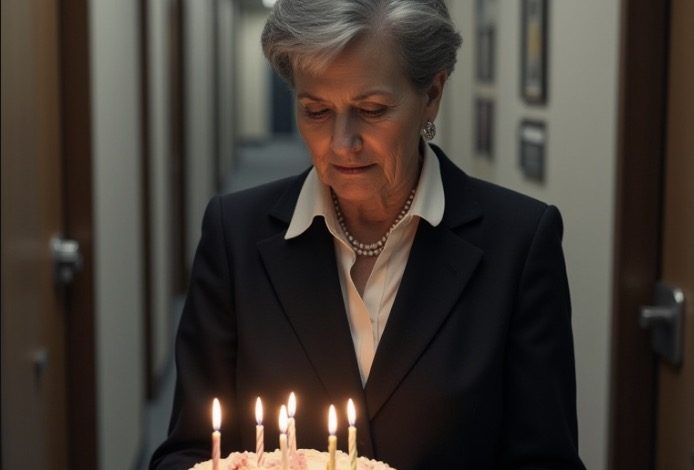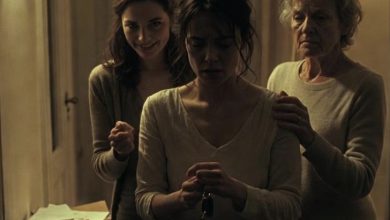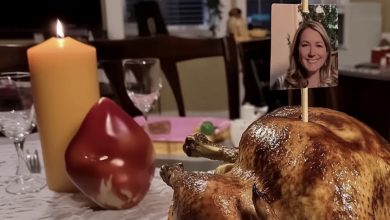“She Said I Wouldn’t Be Around Much Longer… What I Found in My Son’s Desk Proved the Truth”

The morning of my son Richard’s forty-fifth birthday began like many others, but with a special purpose. I rose early, tied on my apron, and pulled out the family recipe that had followed us through decades: Richard’s favorite chocolate cake. It was the same one I had baked since his seventh birthday, every year without fail.
At sixty-six, my hands were not as quick as they once had been. I needed to rest between each step—measuring flour, melting butter, whisking eggs. Yet, as I carefully piped the blue letters across the smooth chocolate frosting, I felt almost young again. “Happy 45th Birthday, Richard.” It looked perfect, even if my hands shook slightly.
I thought of the little boy who once blew out candles with his cheeks puffed up, making secret wishes I never got to hear. He had grown into a man—an accomplished lawyer with his own practice, a wife, and a house so large it seemed like another world from where I lived.
Our phone calls had grown shorter in recent years. His “Love you, Mom” sounded more like a quick phrase than something felt. Still, I thought this surprise might remind him of who he was, and who I had always been for him. I wanted to show him I was proud, still his mother no matter how busy or distant he had become.
I carried the cake in its white box to my car and set it carefully on the passenger seat. The drive into town was quiet, the streets still holding the hush of early morning. By the time I arrived at his law firm—Morrison, Patterson & Associates—I felt excited, almost giddy, at the thought of surprising him.
The receptionist, a young woman with kind eyes, looked up as I entered.
“Mrs. Henderson!” she said warmly. “Here to see Richard?”
“It’s his birthday,” I replied, smiling as I lifted the box slightly. “I thought I’d bring him a surprise.”
She nodded approvingly. “He’s in his office with Mrs. Henderson. Go right in.”
Even after three years, it always struck me as odd to hear my daughter-in-law called by my husband’s last name. Stephanie Henderson. It sounded strange, as though she had borrowed something that didn’t quite belong to her.
I walked down the plush-carpeted hallway toward Richard’s corner office. The door was slightly open, and I slowed, about to knock. But then I heard voices. Stephanie’s voice, sharp and polished like a blade.
“Richard, you have to stop feeling guilty,” she said. “She’s sixty-six years old. How much longer can she possibly live? Five years? Ten at best?”
My breath caught. Was she… talking about me?
Richard’s voice followed, low and unsure. “Stephanie, that’s my mother.”
“And she’s standing in the way of everything we deserve,” Stephanie pressed on, her tone firm. “The house alone is worth two million dollars. And don’t forget her investments. Your father left her everything, and she just sits on it like a dragon hoarding treasure.”
I froze outside the door, clutching the cake box so tightly the cardboard bent.
“She earned that money,” Richard said, but his words were weak, lacking the strength of true conviction. “Dad built that business from nothing, and she worked with him for thirty years.”
Stephanie laughed, a sharp, cruel laugh that echoed through the crack in the door. “Worked with him? She answered phones, Richard. She made coffee. That’s not building a business. That’s a secretary who married the boss.”
Anger flared in me. How dare she reduce my life’s work to nothing? I had kept books late into the night, negotiated deals, managed payroll, and sacrificed every comfort to build that company with my husband, James. Yet here was this woman, dismissing it all as if I had been nothing more than decoration.
And then, her voice dropped into something colder, more dangerous.
“The point is, we shouldn’t have to wait for nature to take its course. She won’t be around long to enjoy any of this. Tonight, at the party—it’s the perfect opportunity.”
My blood turned to ice. I leaned closer, peering through the small gap in the door. Richard was hunched over his desk, the drawer wide open. Stephanie stood behind him, her manicured nails resting on his shoulders like claws. Inside the drawer was something that made my knees weaken: a vial filled with clear liquid, a syringe beside it, and a printed sheet of medical notes. The heading was bold, undeniable: Digitalis Toxicity: Symptoms and Dosage.
Digitalis. I knew the name. I had learned it years ago in my garden club. Foxglove flowers were beautiful, but deadly. A few drops could stop a heart.
“The symptoms will look natural,” Stephanie said, her voice calm, almost professional. “Fatigue. Confusion. Nausea. Everyone will think it’s just age catching up with her. Then the heart problems will start, and by the time anyone realizes—”
“Stop,” Richard cut in, but his tone wasn’t horrified. It was weary. Resigned. As though this wasn’t the first time they had discussed it.
“She’s already so tired, Richard,” Stephanie whispered. “Wouldn’t it be merciful to let her go peacefully before it gets worse?”
Merciful. The word twisted inside me like a knife. The dizzy spells I’d had, the sudden exhaustion, the way my mind sometimes felt foggy—had it all been orchestrated? Was I already being poisoned?
“The party tonight is perfect,” Stephanie continued brightly. “Everyone will be there. We’ll raise a toast. She’ll drink her champagne, and a few hours later, she’ll quietly slip away. Everyone will think it was just her heart.”
The cake box slipped from my hands. It fell to the carpet with a muffled thud, frosting smearing across the white cardboard. The voices inside stopped.
“What was that?” Richard asked sharply.
I didn’t wait. I turned and fled down the hallway, past the receptionist who looked at me with confusion, and out into the glaring sunlight. My hands shook as I unlocked my car. I sat behind the wheel, gasping for air, the image of that vial and syringe burned into my mind.
That evening, I sat in my kitchen, staring at the half-cleaned bowls and spatulas from the morning’s baking. My son—my Richard—had sat in his office discussing how best to kill me. And tonight, they planned to do it.
I forced myself to think. To plan. Rage and betrayal could not be the end of my story.
I picked up the phone and called my dearest friend, Carol.
“Linda, how wonderful to hear from you! Are you coming to Richard’s party tonight?”
“Carol,” I said carefully, “I need you to tell me something. Have I seemed forgetful lately? Confused?”
“Forgetful? Linda, you’re the sharpest woman I know. Why?”
“Has Stephanie said anything to you about my health?”
Carol hesitated. “Well… she did mention at the church potluck that she was worried about you. Said you’d been repeating yourself at family dinners. She seemed very concerned.”
It was clear now. Stephanie had been setting the stage for months, creating a story of my decline so that my death would seem natural.
I spent hours searching my late husband’s old computer. Stephanie’s first husband’s obituary appeared after only a few minutes. David Morrison. Died of a sudden heart attack at fifty-two. The obituary mentioned months of fatigue, confusion, and weakness before his death. The same symptoms I had been experiencing.
It wasn’t coincidence. She had done this before.
But this time, she had chosen me.
I opened a drawer in James’s study and found his old digital recorder. It still worked. I slipped it into my purse and pressed record.
When I arrived at Richard’s house that evening, the party was already alive with laughter and music. Stephanie greeted me at the door, stunning in a red dress, her smile wide and false. I hugged her, my skin crawling at her touch.
Inside, I saw familiar faces—friends, neighbors, colleagues. They would all witness what was about to happen.
Later, as the guests gathered for the toast, Stephanie handed me a glass of champagne. It sparkled under the lights, looking just like the others. But I knew better.
I raised it, but instead of drinking, I set it firmly on the table. “Before I take a sip,” I said clearly, “I’d like to make a toast of my own.”
Stephanie’s smile froze.
I pulled the recorder from my purse and pressed play. Richard’s voice filled the room: “I’d be devastated to lose you, Mom… but not devastated to inherit six million dollars.”
Gasps echoed. Stephanie paled.
“And one more thing,” I added, pulling out a printed page. “Stephanie’s first husband, David Morrison, also died suddenly. His symptoms? The exact same ones I’ve been experiencing. Fatigue. Confusion. Heart palpitations. Do we all really believe in coincidence?”
The room erupted. Neighbors whispered, friends looked horrified. Stephanie stammered, but before she could spin another lie, the police were already on their way—thanks to Carol, who had dialed 911 as soon as she heard the recording.
Stephanie was arrested that night. Richard confessed to everything, his cooperation reducing his sentence, but the damage was done.
Months later, I stood in my garden planting tulips, daffodils, and crocuses—flowers that would bloom next spring. A reminder that life continues, even after betrayal.
Stephanie would serve twelve years in prison for attempted murder. Richard was sentenced to five. I visited him monthly. Painful, awkward visits, but necessary. Perhaps we could rebuild something new, something real, out of the ruins of what was destroyed.
I had survived the plan meant to silence me forever. And I was alive to tell the story.










